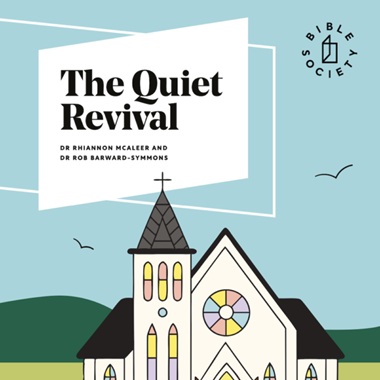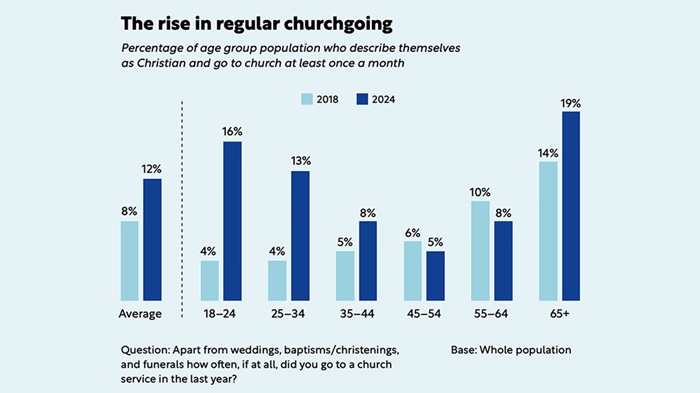 It is common knowledge that the church is shrinking in Europe (and in North America). Right? That’s what we’ve been told over and over.
It is common knowledge that the church is shrinking in Europe (and in North America). Right? That’s what we’ve been told over and over.
However, a significant new study suggests that the trend may be changing – at least where it was focused, in England and Wales.
The Quiet Revival, a survey commissioned by the Bible Society in the United Kingdom, offers some surprising revelations:
Church decline in England and Wales has not only stopped, but the Church is growing, as Gen Z leads an exciting turnaround in church attendance. Church attendance has risen by 50 per cent over the last six years, busting the myth of church decline.
The Quiet Revival shows that the most dramatic church growth is among young adults, particularly young men. In 2018, just 4 percent of 18 – 24 year olds said that they attended church at least monthly. Today, says The Quiet Revival, this has risen to 16 percent, with young men increasing from 4 percent to 21 percent, and young women from 3 to 12 percent.
Local connection

Paul Williams, CEO of the Bible Society, is well known in Vancouver.
Here’s an interesting fact for Metro Vancouver readers:
Paul Williams, now CEO of Bible Society, worked for over a decade in business in London and then as an academic theologian in Canada. He is the visionary behind ReFrame, an innovative resource for whole-life discipleship, produced by Regent College, Vancouver, where he holds a Research Professorship of Marketplace Theology and Leadership.
Williams wrote the Foreword to the study:
The word ‘revival’ is freighted, particularly among Christians from the evangelical tradition, with folk memories of full-to-bursting congregations and dramatically emotional congregational experiences.
This is not necessarily that. Our ‘Quiet Revival’ is low key, but it is widespread. It doesn’t draw attention to a particular leadership style, or way of doing church, or political influence. Instead, the story told in this report is revolutionary in terms of the public assumptions about Christianity in England and Wales, and transformational in terms of how Christians think about themselves.
For decades, Church attendance and nominal adherence to Christianity has been declining, and it has been assumed that this decline would continue and was in some sense an inevitable product of modernity. While the decline has certainly been real, we now know that the trend has been reversed. The tide of faith, whose ‘melancholy, long-withdrawing roar’ was described by Matthew Arnold, has now turned. . . .
The past few decades have witnessed a widespread empirical falsification of the secularisation thesis, mainly because in all parts of the world except Western Europe the world has become more, not less religious. This report suggests that even this outlier may not remain so for much longer.

Key findings from The Quiet Revival
- More men than women go to church
The Quiet Revival shows that men (13 percent) are more likely to attend church than women (10 percent). And as well church decline being reversed, the Church is also becoming more ethnically diverse, with one in five people (19 percent) coming from an ethnic minority. Close to half of young Black people aged 18 – 34 (47 percent) are now attending church at least monthly, according to The Quiet Revival.
It’s also great to see that Bible reading and confidence in the Bible have increased as well as church growth. Some 67 percent of churchgoing Christians read the Bible at least weekly outside church.
- Churchgoers are more likely to give to charity
Church growth has an impact on society, says The Quiet Revival, as churchgoers are more likely to actively participate in things that benefit the local community, such as donating to food banks, volunteering or giving to charity.
Christians also report a higher life satisfaction than non-churchgoers, with a greater connection to their community and less stress and anxiety.
- Why are people finding meaning at church?
The Quiet Revival co-author [with Dr Rhiannon McAleer] Dr Rob Barward-Symmons says that one possible reason for church growth was that people were looking for meaning. ‘With much of the population struggling with mental health, loneliness and a loss of meaning in life, in particular young people, church appears to be offering an answer.
We found that churchgoers are more likely than non-churchgoers to report higher life satisfaction and a greater feeling of connection to their community than non-churchgoers. They are also less likely to report frequently feeling anxious or depressed – particularly young women.’
- Church is alive and well
Bible Society’s chief executive Paul Williams says: ‘The Quiet Revival is a highly significant report which should transform the perception of Christianity and churchgoing in England and Wales. Far from being on a slippery slope to extinction, the Church is alive and growing, and making a positive difference to individuals and society.’
Widely noticed
The report has attracted the attention of mainstream media. An April 21 article in The Guardian, for example, focused on a potential downside of the trend. The headline for Jessica White’s opinion piece read, ‘I’m delighted to see gen Z men in the UK flocking back to church – I just hope it’s for the right reasons.’ She hopes the trend does not reflect the fact that many poorly educated young men simply long for the reinstitution of a more traditional society.
But she adds:
The Bible Society’s report states that more research is needed to fully discern where a desire to join Christian faith communities has stemmed from. The murkier corners of the internet are very probably a factor, but I can’t help but remain cautiously optimistic about the findings.
The report also highlights how a significant concern for all of the gen Z participants interviewed is social activism, with far more churchgoing interviewees recording that they do frequent community and charity work compared to those who are not church members.
This work is recorded as donating to food banks, financial donations to charities, voting in elections, writing to local representatives and communal work such as litter picking. These are hopeful statistics that demonstrate a positive participation in society that is encouraged by churchgoing.
Go here for an introduction to The Quiet Revival and the opportunity to download the full report for free.
****************************************
For a much more local take on a similar issue, look at Jack Taylor’s recent comment for Light Magazine:
I don’t know about you, but my church is full on Sunday mornings. So is my previous church. So is the church my sister-in-law attends. Others seem to have never recovered after Covid. When I listen to surveys, they don’t always jive with what I’m experiencing.
He also noted, “The New York Times recently trumpeted the headline that Christianity’s decline in the US has halted.” Maybe something is going on across the Western world.
Also, Surging Catholic conversions in France,’ on Religion Unplugged.
And Not Just at Easter: Gen Z is returning to Christianity. Data proves it, by Ed Stetzer in USA Today.

As a former Vancouverite who is now living in Cambridge UK, I can absolutely attest to the health of the church here – at least at the church I attend. St. Barnabas Church (C of E) has families, students and oldsters, and is a vital place very focused on evangelism with dynamic Bible-based preaching and teaching.
I have now been here for almost five years and the whole city and community seems very Christian compared to Vancouver. I know most of my neighbours up and down the street and many of them are also Christian. It has made a huge difference in my own personal spiritual walk to be so upheld in my faith.